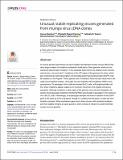Unusual, stable replicating viruses generated from mumps virus cDNA clones
Abstract
In reverse genetic experiments we have isolated recombinant mumps viruses (rMuV) that carry large numbers of mutations clustered in small parts of their genome, which are not caused by biased hyper-mutation. In two separate experiments we obtained such recombinant viruses: one virus had 11 mutations in the V/P region of the genome; the other, which also contained an extra transcription unit encoding green fluorescent protein (EGFP), had 32 mutations in the N gene. These specific sets of mutations have not been observed in naturally occurring MuV isolates. Unusually, the vast majority of the mutations (48/51) were synonymous. On passage in Vero cells and human B-LCL cells, a B lymphocyte-like cell line, these mutations appear stable as no reversion occurred to the original consensus sequence, although mutations in other parts of the genome occurred and changed in frequency during passage. Defective interfering RNAs accumulate in passage in Vero cells but not in B-LCL cells. Interestingly, in all passaged samples the level of variation in the EGFP gene is the same as in the viral genes, though it is unlikely that this gene is under any functionality constraint. What mechanism gave rise to these viruses with clustered mutations and their stability remains an open question, which is likely of interest to a wider field than mumps reverse genetics.
Citation
Bamford , C , Wignall-Fleming , E , Sreenu , V B , Randall , R , Duprex , P & Rima , B 2019 , ' Unusual, stable replicating viruses generated from mumps virus cDNA clones ' , PLoS ONE , vol. 14 , no. 7 , e0219168 . https://doi.org/10.1371/journal.pone.0219168
Publication
PLoS ONE
Status
Peer reviewed
ISSN
1932-6203Type
Journal article
Description
The authors have acknowledged funding from a Wellcome Trust grant 101788/Z/13/Z to RER and funding from the respective universities for studentships, Queen’s University Belfast to CGB, and University of St Andrews to EWF.Collections
Items in the St Andrews Research Repository are protected by copyright, with all rights reserved, unless otherwise indicated.

